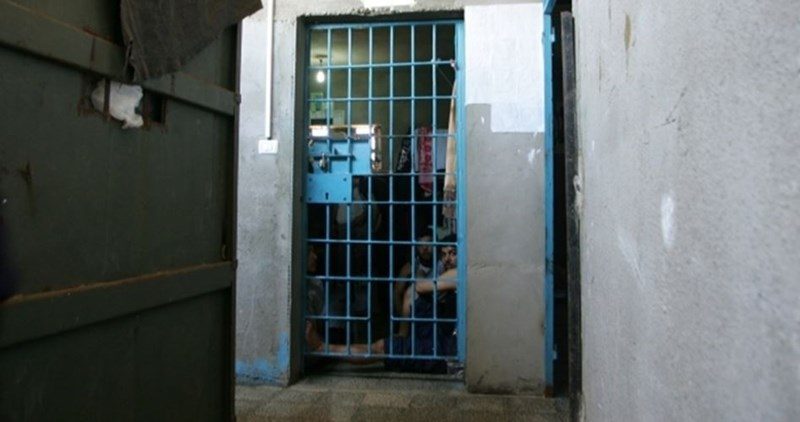
50 Palestinian prisoners declared their intention to go on hunger strike in solidarity with Mohamed and Mahmoud al-Balboul and Malik al-Qadi, the Palestinian Prisoners Society (PPS) revealed. The rights group affirmed that 50 prisoners affiliated with Jihad and Fatah movements and held in Negev, Nafha, Ofer, and Raymond prisons are scheduled to wage a solidarity hunger strike in support of the three hunger strikers’ demands. There are currently three Palestinians – detained without charge – in Israeli prisons who are on hunger strike one of whom, Al-Qadi, 23, slipped into a coma on Saturday. Hunger strikes have become a high profile means by which Palestinians can peacefully resist their capture and arbitrary detainment by Israeli authorities.
For its part, The International Committee of the Red Cross (ICRC) released a statement on Friday, expressing the organization’s concern with the severely deteriorating health of three hunger-striking Palestinian prisoners currently protesting their administrative detention orders.
In the statement, the ICRC addressed the cases of Malek al-Qadi, and brothers Muhammad and Mahmoud Balboul, who have all been on hunger strike for more than 60 days, and are currently being held in Israeli hospitals.
“At this very critical time, we encourage the patients, their representatives and the competent authorities to find a solution that will avoid any loss of life or irreversible damage to their health,” Dr. Hishal said, the ICRC’s doctor who has regularly visited the hunger-striking detainees in hospital.
The organization highlighted that its delegates and medical staff have continued to monitor the health conditions of the detainees and their treatment by Israeli prison and medical authorities.
“The ICRC has been in close contact with their families, whom it has kept informed of developments, in accordance with their wishes, and transmitted personal news between them,” the statement said.
Highlighting the gravity of sustaining oneself without any food, vitamin, or form of nourishment except for water, the statement continued, saying the “ICRC staff seek to ensure that all detainees on hunger strike are fully aware of the implications of their decision, and that they are acting on their own initiative and free will.”
In recent weeks, groups of Palestinian youth, activists, and politicians staged sit-in protests in multiple ICRC offices in the occupied West Bank, accusing the organization of not having taken any effective measures to resolving the issue of Palestinian prisoners on hunger strike.
The ICRC’s statement came on the same day that the head of the Palestinian Committee of Prisoners’ Affairs Issa Qaraqe made a statement that al-Qadi’s current medical state made him the Palestinian hunger striking prisoner in the most critical condition since 2011.
According to Qaraqe, al-Qadi has been “fighting death” at the Wolfson Medical Center, as he has remained in a coma for five days, while suffering from a severe lung infection, low heart rate, urinary system complications, puffiness around the eyes, and hearing loss.
Human rights groups have raised alarm bells over the health relapse rocking Palestinian hunger-striker Malek al-Qadi after two months of ongoing hunger strike in Israeli detention. According to a statement by the Muhjat al-Quds Foundation, al-Qadi’s health status has taken a critical turn for the worse due to the infections contaminating his body as a result of the hunger strike. Al-Qadi will be kept in a medically-induced coma for at least one week, the same source said, adding that he might breathe his last at any possible moment. The Israeli High Court turned down an appeal, filed for the second time, to release hunger-striker al-Qadi before it is too late. The Israeli Supreme Court also claimed that it ruled for the suspension of al-Qadi’s administrative term until his health condition improves. The order stated that the detainee is to be kept in the Israeli hospital until his health condition gets better. Once his health status stabilizes, another sentence might be issued against him. Talking to a PIC journalist, the detainee’s attorney, Ahlam Hadad, quoted the deputy director of the Israeli Wolfson Hospital as stating that al-Qadi’s health has remarkably gone down and that he has been through critical cardiovascular disorders. The detainee has been subjected to a barbiturate-induced coma at the Israeli hospital, where he has lost his hearing ability. Activists also raised concerns over an Israeli attempt to force-feed him against his will. Born on June 4, 1996 and arrested on May 22, 2016, prisoner al-Qadi was held in administrative detention, without charge or trial, for four months. He was released in April before he was re-arrested by the occupation forces shortly afterwards, which made him declare an open-ended hunger strike. Malek al-Qadi along with brothers Muhammad and Mahmoud al-Balboul continue their hunger strike in Israeli jails in protest at their administrative detention.
In the same context. The Assembly of Palestinian doctors in Europe (PalMed) warned of the serious upshots of an Israeli bill to force-feed Palestinian hunger-striking detainees, saying the law amounts to a legitimization of murder. PalMed Chairman, Dr. Mondher Rajab, slammed the Israeli force-feeding law, dubbing it a barefaced incitement to the murder of Palestinian hunger-strikers in Israeli jails and a call to torture.
PalMed charged that the force-feeding law flagrantly violates the World Medical Association’s Declaration of Malta 1991 which states, “forcible feeding is never ethically acceptable.” The Assembly also said that feeding induced by threats or coercion is inhumane and that it violates the 1975 World Medical Association Declaration of Tokyo which explicitly states that force-feeding is a crime and a form of torture.
The statement also pointed to the serious health complications of this cruel measure on the prisoners’ health; as it is very painful and it may lead to death as what actually happened with a number of Palestinian prisoners. In earlier statements, the Assembly called on international health institutions, and human rights organizations, including the United Nations, the Red Cross, and Doctors Without Borders, to immediately condemn the Israeli decision and pressure the occupation government to cancel it, improve the prisoners’ detention conditions, and allow doctors’ visits to check on the prisoners’ health status.
The Supreme Court of Israel on Sunday ruled to allow for the force-feeding of Palestinian prisoners who are on hunger strike after a panel of judges rejected a petition which called to cancel the force-feeding bill. The Knesset voted the “force-feed” bill into law in July 2015, with 46 MKs voting in favor and 40 voting against. The ruling upheld a 2015 law to allow force-feeding as constitutional, despite a range of objections by human rights organizations. Hunger strikes have become a high profile means by which Palestinians can peacefully resist their capture and arbitrary detainment by Israeli authorities.
Relatives of Palestinian prisoners in Israeli Megiddo and Gilboa jails have appealed for halting the ill-treatment and harassment they face during family visits at the hands of Israeli jailers.
Following his visit to his imprisoned sons, father of the two prisoners Baha al-Din and Ezz al-Din Abdul Haq revealed that prisoners’ relatives were subjected to very bad treatment and prevented from delivering clothes to their sons in Megiddo and Gilboa prisons.
They waited for long hours despite the hot weather before being allowed to see their sons, he continued. He pointed out that the prisoner Ragheb Alawi’s family was prevented from meeting their son despite obtaining a visit permit.
According to prisoners rights group Addameer, as of August, 7,000 Palestinians were being held in Israeli prisons, 700 of whom were being held under administrative detention.



